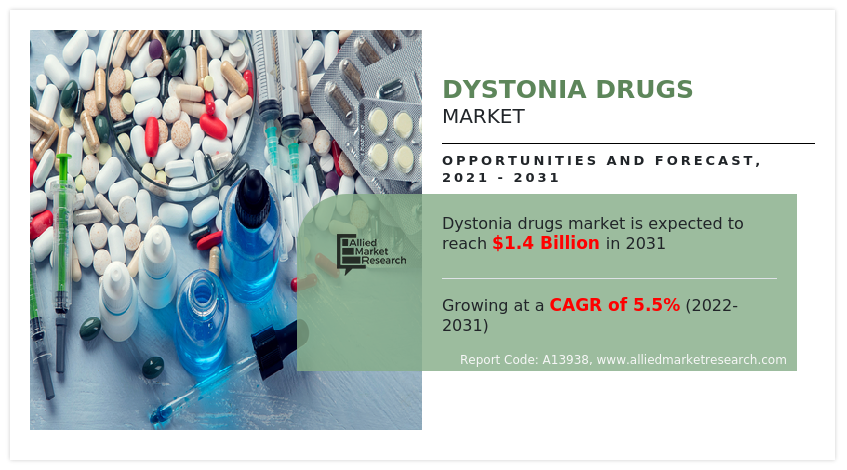
Dystonia Drugs Market Growth 2023: Industry To Grow Expeditiously to Reach USD 1378.67 Million by 2031
According to the report published by Allied Market Research, the global dystonia drugs market was valued at $806.67 million in 2021, and is projected to reach $1,378.67 million by 2031, registering a CAGR of 5.5% from 2022 to 2031. The study analyzes the important strategies, drivers, competition, market dynamics, size, and important investment regions.
Key Takeaways:
Dystonia is a neurological movement disorder characterized by involuntary muscle contractions that result in abnormal postures and repetitive movements. It can affect various parts of the body, including the neck, limbs, or entire body.
The dystonia drugs market has witnessed significant growth in recent years, driven by an increasing prevalence of dystonia worldwide. Factors such as aging population, improved awareness and diagnosis, and advancements in treatment options have contributed to the market expansion.
Botulinum toxin injections, particularly Botox (onabotulinumtoxinA), are the most common and effective treatment for dystonia. Botulinum toxin works by blocking the release of acetylcholine, a chemical messenger that causes muscle contractions. It helps in reducing muscle spasms and improving symptoms in dystonia patients.
Other oral medications, such as anticholinergics (e.g., trihexyphenidyl) and muscle relaxants (e.g., baclofen), are prescribed to manage dystonia symptoms. These drugs help to reduce muscle rigidity and involuntary movements.
Deep brain stimulation (DBS) is a surgical procedure that involves implanting electrodes in specific areas of the brain to modulate abnormal electrical signals and alleviate dystonia symptoms. DBS is usually considered when medications or botulinum toxin injections fail to provide adequate relief.
The dystonia drugs market is characterized by several key players, including Allergan (AbbVie), Ipsen, Merz Pharmaceuticals, Revance Therapeutics, and Medtronic. These companies are involved in the development, manufacturing, and distribution of dystonia drugs and related therapies.
Request Sample Copy of the Report:
https://www.alliedmarketresearch.com/request-sample/14307

Market Drivers:
Increasing Prevalence of Dystonia: The rising prevalence of dystonia globally is a significant driver for the market. Dystonia can occur at any age, but it is more commonly diagnosed in middle-aged and older individuals. As the population ages and awareness about the disorder improves, more cases are being diagnosed, leading to increased demand for dystonia drugs.
Advancements in Diagnosis and Awareness: Improved diagnostic techniques and increased awareness among healthcare professionals and the general population have led to better identification and diagnosis of dystonia. As a result, more patients are being accurately diagnosed with the condition, driving the demand for effective treatment options.
Market Segmentation:
Drug Class: Dystonia drugs can be categorized based on the class of medication they belong to. The main drug classes used for dystonia treatment include:
- Route of Administration: This segmentation refers to the way drugs are administered to patients. The common routes of administration for dystonia drugs include:
- Oral: Medications that are taken by mouth, such as anticholinergics and muscle relaxants.
- Injectable: This includes botulinum toxin injections, which are administered directly into the affected muscles.
- Transdermal: Some drugs can be delivered through patches applied to the skin, allowing for controlled drug release. This approach is being explored for botulinum toxin delivery.
End User: The dystonia drugs market can be segmented based on the end users who prescribe and administer these medications. The key end users include:
- Hospitals and Clinics: These include neurology clinics, movement disorder centers, and other healthcare facilities where patients receive diagnosis, treatment, and management for dystonia.
- Homecare Settings: Dystonia patients who require long-term medication management may receive treatment at home with the assistance of healthcare professionals or family caregivers.
Geography: The market can also be segmented based on geographical regions, such as North America, Europe, Asia Pacific, Latin America, and the Middle East and Africa. Different regions may have variations in the prevalence of dystonia, healthcare infrastructure, regulatory frameworks, and market dynamics.
Request for Customization –
https://www.alliedmarketresearch.com/request-for-customization/14307
Competitive Landscape:
AbbVie Inc., Amneal Pharmaceuticals LLC., F. Hoffmann-La Roche Ltd, Hameln Pharma GmbH, Ipsen Pharma, Merz Pharmaceuticals, LLC, Novartis AG, Pfizer Inc., Teva Pharmaceuticals and Wellona Pharma.
Recent developments:
- Approval of New Botulinum Toxin Products: In 2020 and 2021, new botulinum toxin products received regulatory approvals for the treatment of dystonia. For example, DaxibotulinumtoxinA (also known as DAXI) developed by Revance Therapeutics received approval from the U.S. Food and Drug Administration (FDA) for the treatment of adult upper limb spasticity in 2020. These new formulations aim to offer longer durations of action and potentially reduce the need for frequent injections.
- Advancements in Gene Therapy: Gene therapy is an emerging field in dystonia treatment. Several studies and clinical trials are investigating the potential of gene therapy approaches for specific forms of dystonia. Preliminary results from some studies have shown promise in improving symptoms and providing long-term benefits. Continued research in this area may lead to novel treatment options in the future.
Buy this Premium Research Report:
https://www.alliedmarketresearch.com/purchase-enquiry/14307
VALUE PROPOSITIONS RELATED TO THE REPORT:
- Powered with Complimentary Analyst Hours and Expert Interviews with Each Report
- Comprehensive quantitative and qualitative insights at segment and sub-segment level
- Covid 19 impact trends and perspective
- Granular insights at global/regional/country level
- Deep-rooted insights on market dynamics (drivers, restraints, opportunities) and business environment
- Blanket coverage on competitive landscape
- Winning imperatives
- Exhaustive coverage on ‘Strategic Developments’ registered by leading players of the market
Browse more latest healthcare reports:
Disposable Medical Sensors Market
About Us:
Allied Market Research (AMR) is a full-service market research and business-consulting wing of Allied Analytics LLP based in Portland, Oregon. Allied Market Research provides global enterprises as well as medium and small businesses with unmatched quality of “Market Research Reports” and “Business Intelligence Solutions.” AMR has a targeted view to provide business insights and consulting to assist its clients to make strategic business decisions and achieve sustainable growth in their respective market domain.
Contact Details:
David Correa
USA/Canada (Toll-Free): +1-800-792-5285, +1-503-894-6022
help@alliedmarketresearch.com
Editor Details
-
Company:
- The Wire Times
